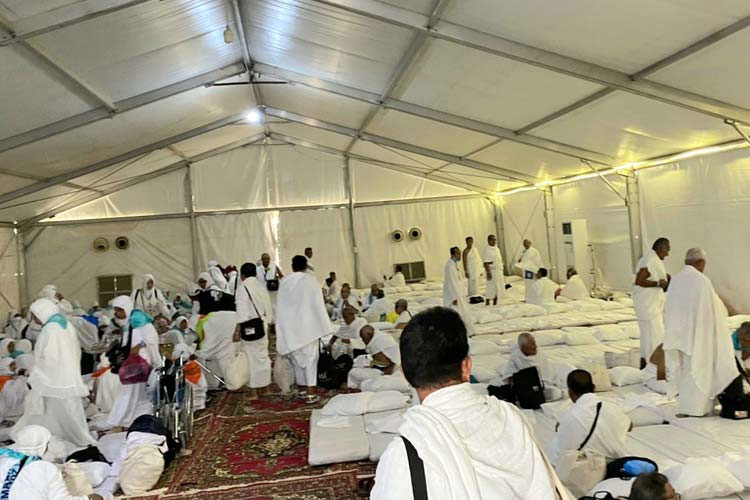The Significance and Experience of Arafah for Indonesian Pilgrims

TIMESINDONESIA, MAKKAH – As millions of Muslims around the world congregated at Arafah on 27th June 2023 to partake in one of the most important rites of the Hajj pilgrimage, Indonesian pilgrims could be found among the crowds. For these individuals, attending Arafah is a deeply significant and personal experience that they have eagerly awaited for years, and they have come prepared to fully immerse themselves in the spiritual aspects of this important event.
Arafah holds a special place in the hearts of Muslims worldwide as it is believed to be the place where the Prophet Muhammad (SAW) gave his farewell sermon. For Indonesian pilgrims, Arafah is the pinnacle of their journey to the Holy Land as they stand humbly before Allah (SWT) seeking His forgiveness, prayers, and blessings. They consider it an opportunity to capture God's mercy and ultimately to become better human beings.
Advertisement
Despite the anticipation and excitement of being granted the opportunity to visit Arafah, the journey itself is riddled with challenges. The difficulty extends beyond the arduous physical journey that requires considerable stamina and resilience; it is also a test of faith, patience and self-control. Hajj requires strict adherence to specific rites that are clearly outlined in Islamic law, and any deviation from these tenets can render the entire Hajj journey invalid, depriving the Muslim of its spiritual benefits. However, many Indonesian pilgrims appreciate the challenges they face and are grateful for the spiritual strength that they acquire as a result.
Before and during the journey to Arafah, pilgrims from Indonesia are subjected to several preparatory sessions to ensure that they possess the requisite knowledge and mental readiness to successfully navigate the journey and fully benefit from their time at the holy site. The Indonesian government has specific guidelines and regulations that all pilgrims must adhere to, and these guides are provided in the form of written and verbal instruction.
Upon arriving at Arafah, the pilgrims from Indonesia are assigned to tents in which they spend the night of Arafah. The day starts with morning prayers, and after that, they meet with their tour guides who remind them of the dos and don'ts of the day. This includes a reminder to avoid any activity that may conflict with the Ihram status, which is considered crucial to preserving the spiritual essence of the Hajj pilgrimage. These activities include killing animals, abusing drugs, or engaging in sexual relations.
According to Yendra Al Hamidy, the Guidance Counsellor of Indonesian Hajj Pilgrimage in Madinah, the participants are then encouraged to focus on their religious devotion rather than their materialistic concerns. This is because the environment at Arafah serves to remove any worldly hindrances that may hinder the pilgrims' spiritual development. Participants are encouraged to spend their time reading the Quran, repenting, seeking forgiveness and engaging in other acts of worship that will please Allah (SWT).
During the wukuf, pilgrims from Indonesia follow a preordained schedule. As part of the rites, they listen to a sermon or khutbah, which instructs them to remember Allah (SWT), resulting in increased spiritual awareness and proximity to the divine. Participants are encouraged to pray and engage in remembrance activities such as chanting tasbih, tahlil, and tahmid, and to maintain a mindset of deep contemplation. These activities continue till late in the evening and culminate in the combined prayer of Asr and Zuhr that is performed under the guidance of qualified imams.
After the prayer, the pilgrims break for lunch and take some rest before resuming the wukuf activities. At this point, they reflect on the various aspects of their lives that require improvement, seek Allah's (SWT) forgiveness, and renew their commitment to live a righteous life.
Yendra Al Hamidy explains that the Hajj pilgrimage to Arafah is an opportunity for Muslims from Indonesia to grow in both their spirituality and religious knowledge. Pilgrims return home with a greater sense of morality, self-discipline, and inner peace. Being in Arafah, a place that is known to facilitate a closer relationship with Allah (SWT), can serve as an eye-opening experience and reawaken one's sense of purpose and connection with their faith.
In addition to the spiritual benefits derived from attending Arafah, the Indonesian government also provides pilgrims with practical health, safety, and support services. The Indonesian government accords significant priority to these hajj services to ensure that the pilgrims are healthy and safe throughout their journey. There are trained personnel at every stage of the journey to provide emergency medical services, assistance with local communication, and other forms of practical support. These services ensure that the Hajj pilgrimage is not only a journey of spiritual growth, but also one of practical care.
In conclusion, Arafah represents a vital aspect of the Hajj pilgrimage for Indonesian pilgrims. It is a platform for spiritual growth, reflection, and self-improvement and provides a unique opportunity to connect with the divine. The journey to Arafah, though challenging, is a transformative experience that serves to strengthen the pilgrims' faith and deepen their connection with Allah (SWT). Finally, it is crucial to note that the preparations, guidance, and support provided by the Indonesian government ensure that the pilgrims receive quality care throughout their journey, facilitating an optimal experience at Arafah.(*)
**) Ikuti berita terbaru TIMES Indonesia di Google News klik link ini dan jangan lupa di follow.
| Editor | : Khodijah Siti |
| Publisher | : Ahmad Rizki Mubarok |

